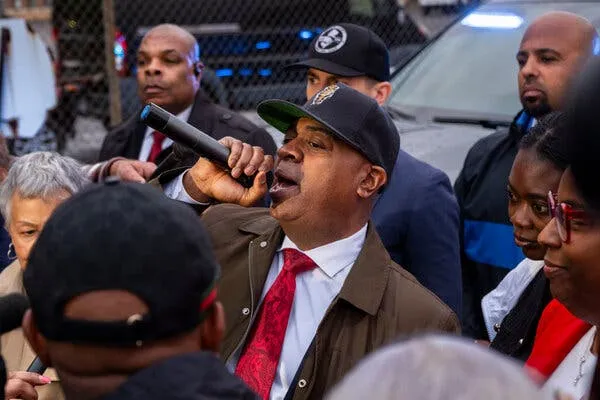Introduction
The city of Newark is at the center of a legal saga after its mayor, Ras Baraka, filed a lawsuit against Alina Habba, New Jersey’s interim U.S. Attorney, claiming false arrest and malicious prosecution. The incident that triggered this lawsuit occurred at a local immigration detention site, leading to wider discussions about accountability, fairness, and the ramifications of federal actions in local communities.
The Incident
According to Baraka’s complaint, the arrest was not only unwarranted but also emblematic of a larger trend of federal overreach in local affairs. On the day of the incident, Baraka visited the immigration jail to address growing concerns about the treatment of detainees. He aimed to inspect the conditions and meet with detainees who had been separated from their families, and facing the anxiety of deportation.
However, the visit took a dramatic turn when federal authorities, led by Habba, apprehended him on charges that have since been deemed baseless. The mayor’s lawyers argue that the actions taken by Habba and her team stemmed from a misunderstanding or outright disregard for the mayor’s official capacity and rights.
The Legal Arguments
The lawsuit filed by Baraka cites multiple instances of what he describes as malicious prosecution, arguing that the circumstances surrounding his arrest were not only unfounded but that they reflect an abuse of power on the part of the federal authorities. The crux of Baraka’s claim suggests that Habba’s office overstepped its boundaries, particularly in seeking to discipline or intimidate local officials who are openly advocating for immigrant rights and reform in detention practices.
Baraka’s legal team has presented extensive documentation that they believe demonstrates the lack of any legitimate cause for the arrest. Witnesses corroborated Baraka’s assertion that he was conducting official mayoral duties at the time, making the actions of federal law enforcement officers not just disturbing but also potentially illegal. The lawsuit seeks both compensatory and punitive damages, aiming to hold federal prosecutors accountable for what is perceived as an unwarranted encroachment into local governance.
Alina Habba’s Response
In the aftermath of the lawsuit’s announcement, Alina Habba issued a statement through her office asserting that the arrest was legally justified based on the information available to federal authorities at the time. She emphasized that her office has a duty to uphold federal law and ensure that breaches are addressed, especially in sensitive environments like immigration detention facilities.
Habba further indicated that her office would vigorously defend against the allegations made by Baraka, asserting that they were politically motivated. The response has opened up a deeper dialogue about the relationship between local government and federal law enforcement.
The Wider Implications
This case brings to light several critical issues concerning the treatment of immigrants, the autonomy of local governments, and the often-blurry lines between federal authority and local governance in the United States. The relationship between New Jersey’s state political atmosphere and federal immigration policy continues to be contentious, especially in cities like Newark, where a significant population consists of immigrants from diverse backgrounds.
Local advocates have rallied around Baraka’s lawsuit, viewing it as not just a personal grievance but a challenge to widespread injustices faced by immigrant communities. Many feel that federal actions, especially in terms of immigration enforcement, have sometimes overshadowed the basic rights and dignities of individuals, particularly in states and localities trying to implement more humane policies.
Public Reaction
The public’s reaction to the lawsuit has been varied. Supporters of Baraka have praised his bold stance against federal overreach, arguing that it represents a shift toward more assertive local governance when it comes to managing community affairs. They believe that laws should be applied equitably, regardless of race or immigration status, and that the mayor’s actions represent a positive step toward tackling systemic issues against institutional racism.
Critics, on the other hand, have echoed Habba’s sentiments regarding the necessity of maintaining federal authority concerning immigration laws, viewing Baraka’s actions as an obstruction to law enforcement. They argue that the mayor’s criticisms may dilute the seriousness of federal charges in immigration law enforcement and complicate the relationship between local authorities and federal agencies.
The Future of the Case
As the lawsuit proceeds, it is likely to draw significant media attention, analyzing the legality of federal actions and the rights of local officials. Legal experts predict that the case may set important precedents regarding the authority of U.S. Attorneys in dealing with local officials, especially in immigration contexts.
Both sides will likely present extensive arguments regarding the implications of this case, with the potential to reach federal courts, where broader interpretations of power struggles between local and federal authorities will be scrutinized. The outcome may have significant repercussions not just for Baraka and Habba but for how cities across the country navigate relationships with federal enforcement concerning immigration and other community affairs.
Conclusion
The lawsuit filed by Newark Mayor Ras Baraka against U.S. Attorney Alina Habba represents more than just a legal dispute; it symbolizes the ongoing struggles between local governments advocating for their constituents’ rights and federal authorities tasked with enforcing laws that many view as unjust. This case will undoubtedly be followed closely, as it has the potential to resonate far beyond Newark and set standards for how local officials navigate complex and often contentious landscapes in immigration and beyond.






